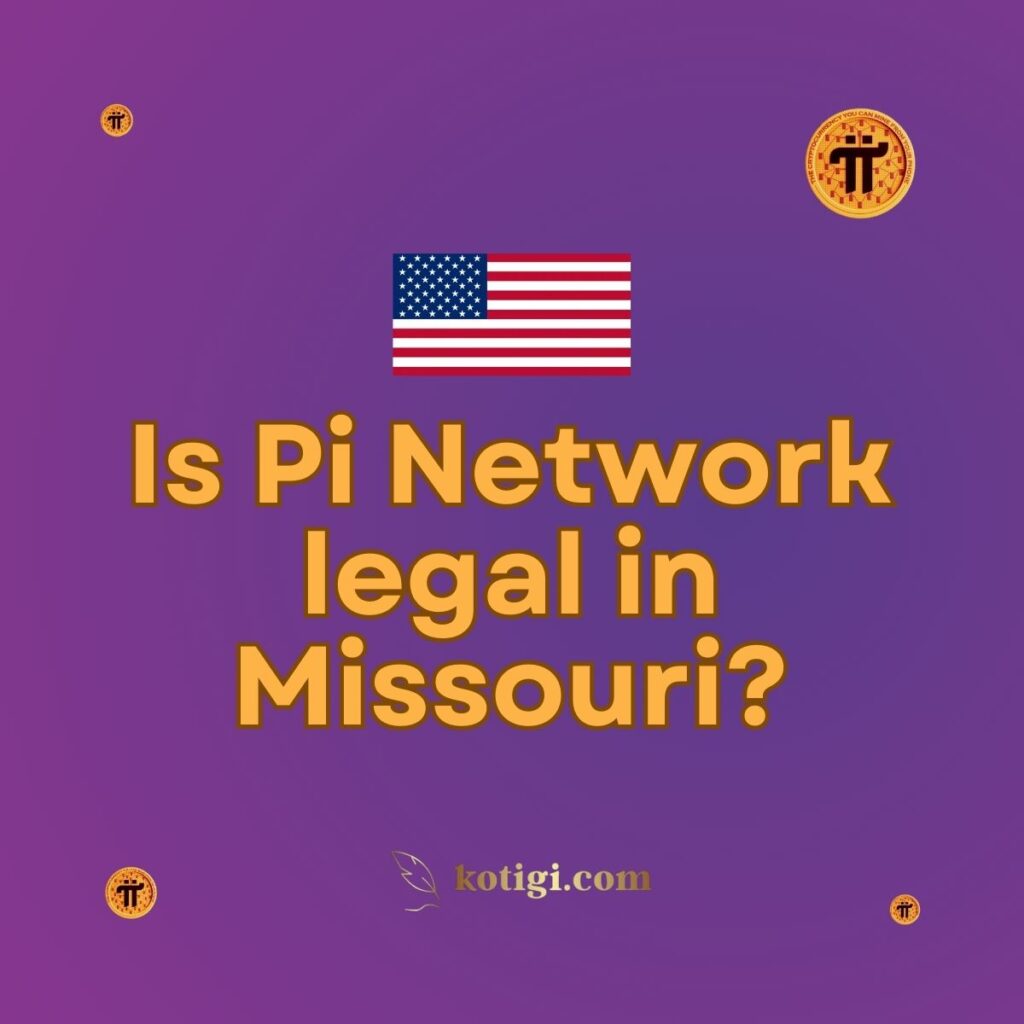
Is Pi Network legal in Missouri?
Pi Network is legal in Missouri as there are no specific state laws prohibiting its use or mining. However, users must adhere to federal cryptocurrency regulations, including tax obligations and Know Your Customer (KYC) compliance for a secure and compliant experience.
Introduction
Cryptocurrency is gaining momentum worldwide, and Pi Network, with its innovative approach to mobile mining, has captured the attention of many. However, one critical question for potential users, especially in Missouri, is whether Pi Network is legal in the state. Cryptocurrency regulations can vary greatly by location, so it’s essential to understand Missouri’s stance on digital currencies like Pi Network. In this blog post, we’ll explore the legal landscape of cryptocurrency in Missouri, Pi Network’s compliance with federal laws, and what users should know to safely participate in this growing ecosystem.
Cryptocurrency Regulations in the United States
Federal Oversight of Cryptocurrencies
In the U.S., cryptocurrency is primarily regulated by federal authorities, including the Internal Revenue Service (IRS), the Securities and Exchange Commission (SEC), and the Financial Crimes Enforcement Network (FinCEN). Each of these institutions plays a role in ensuring that digital currencies, such as Pi, are used within legal bounds.
IRS: Taxation and Reporting
The IRS views cryptocurrencies as property, meaning that any profits from their trade, mining, or exchange are subject to capital gains taxes. This federal guideline applies to all states, including Missouri. If you mine Pi tokens or trade them, you are expected to report these earnings to the IRS, just like any other income.
SEC: Securities Law Considerations
Though Pi Network is currently not classified as a security, the SEC could potentially get involved if Pi tokens are traded on exchanges in the future. The SEC enforces laws to protect investors and ensure that securities markets operate fairly, and any shift in how Pi tokens are viewed could bring them under the SEC’s jurisdiction.
FinCEN: KYC and AML Compliance
FinCEN requires all cryptocurrency platforms, including Pi Network, to adhere to Know Your Customer (KYC) and Anti-Money Laundering (AML) standards. These rules are in place to prevent illegal activities, such as money laundering and fraud, making KYC compliance critical for Pi Network users in Missouri and elsewhere.
Cryptocurrency Laws in Missouri
State-Level Cryptocurrency Regulations
Missouri does not currently have state-specific laws that directly regulate cryptocurrency usage. This creates a more open environment for crypto enthusiasts, as there are fewer legal obstacles compared to states like New York, where businesses must acquire a BitLicense to operate.
Missouri’s General Stance on Cryptocurrency
The state of Missouri has not passed specific legislation regarding cryptocurrencies, making it one of the more relaxed states in terms of digital currency regulation. This means that individuals in Missouri are free to use and mine cryptocurrencies like Pi without the need for special licenses or government approval, provided they comply with federal laws.
Impact of Federal Laws in Missouri
Even though Missouri lacks state-specific cryptocurrency regulations, users and businesses must still follow federal cryptocurrency laws. This includes ensuring tax compliance with the IRS and adhering to SEC regulations if Pi tokens become tradeable securities in the future.
Comparison to Stricter Regulatory States
To understand Missouri’s position better, it’s helpful to compare it to states like New York, where cryptocurrency regulations are stringent. In New York, businesses must adhere to the BitLicense, a regulatory framework that governs cryptocurrency operations. Missouri, in contrast, offers a more relaxed environment for cryptocurrency activities, giving users more freedom to mine and use Pi Network.
What Is Pi Network?
Overview of Pi Network
Pi Network is a decentralized digital currency that allows users to mine Pi tokens directly from their smartphones. Unlike Bitcoin and other cryptocurrencies that require expensive hardware for mining, Pi Network makes it possible for anyone with a mobile device to participate.
How Pi Network Works
Pi Network operates on a consensus algorithm known as Stellar Consensus Protocol (SCP). This consensus mechanism enables users, or “Pioneers,” to validate transactions without the need for resource-intensive mining equipment. As a result, Pi Network is more energy-efficient and user-friendly than traditional cryptocurrencies.
Pi Tokens and Their Utility
Currently, Pi tokens are in the pre-mainnet phase and cannot be traded or used for transactions outside of the Pi ecosystem. However, the long-term goal is for Pi tokens to gain real-world utility, allowing users to trade them for goods and services or exchange them for other cryptocurrencies.
Legal Considerations for Pi Network Users in Missouri
Mining and Using Pi Network in Missouri
As mentioned earlier, Missouri does not have specific laws targeting cryptocurrency use, making it a favorable environment for Pi Network users. Individuals in Missouri can mine Pi tokens through the mobile app without needing to worry about state-imposed restrictions or licenses.
KYC Compliance
One crucial aspect of using Pi Network is the completion of KYC (Know Your Customer) verification. This process ensures that users are who they claim to be, thereby reducing the risk of fraud or illegal activity. All Pi Network users must complete the KYC process before they can migrate their mined Pi tokens to the mainnet.
Federal Compliance for Missouri Users
Although Missouri does not have specific cryptocurrency laws, federal regulations still apply. This means that Pi Network users in the state must ensure they are compliant with IRS reporting requirements and other federal mandates, such as those related to securities and anti-money laundering efforts.
Potential Legal Risks
While Pi Network is currently legal in Missouri, there are potential legal risks to be aware of, especially if regulations change. Users should stay informed about any new laws that may be passed in the state or at the federal level that could impact their use of Pi Network.
The Role of KYC and Security in Pi Network
Importance of KYC
The KYC process is essential for ensuring the security and legality of Pi Network. By verifying user identities, Pi Network reduces the likelihood of fraud and illegal activities on the platform, aligning with global anti-money laundering standards.
Benefits of Completing KYC
Completing KYC allows users to fully participate in Pi Network, including migrating their tokens to the mainnet once it is launched. Users who fail to complete the KYC process will not be able to access their Pi tokens, making this step a critical part of the Pi Network experience.
Security Features of Pi Network
In addition to KYC, Pi Network has implemented several security measures to protect its users. These include encryption, two-factor authentication (2FA), and secure wallet features. Users in Missouri and beyond can rest assured that their tokens and personal information are well-protected on the platform.
Tax Implications of Pi Network in Missouri
IRS Requirements for Reporting Cryptocurrency Earnings
As with any cryptocurrency, Pi Network earnings are subject to taxation under federal law. The IRS classifies cryptocurrencies as property, meaning that any profit made from selling or trading Pi tokens is subject to capital gains tax. This applies to users in Missouri as well.
Taxable Events for Pi Network Users
A taxable event occurs when you sell, trade, or otherwise dispose of Pi tokens. While Pi tokens are not yet tradeable on exchanges, users should be prepared to report any taxable events once the mainnet is launched and the tokens gain value.
Record-Keeping for Missouri Residents
Missouri residents using Pi Network should keep detailed records of their mining activities, including when they mined Pi tokens and how many were earned. This will be crucial for tax reporting purposes once the tokens become tradeable.
Future Regulatory Changes
Potential for State-Level Cryptocurrency Regulations
Although Missouri does not currently have specific cryptocurrency laws, future regulatory changes could alter the legal landscape. As cryptocurrencies become more popular, it’s possible that Missouri lawmakers may introduce new legislation aimed at regulating their use.
What This Means for Pi Network Users
Pi Network users in Missouri should stay informed about any potential regulatory changes that could affect their participation in the network. Engaging with local cryptocurrency advocacy groups and staying updated on news related to cryptocurrency laws can help users navigate any future legal challenges.
Federal-Level Regulatory Changes
On a federal level, the legal framework for cryptocurrencies is still evolving. Users should keep an eye on developments from federal agencies like the IRS and SEC, as these organizations play a significant role in shaping cryptocurrency regulation.
Comparing Pi Network to Other Cryptocurrencies
Pi Network vs. Bitcoin
One of the primary differences between Pi Network and Bitcoin is the mining process. Bitcoin mining requires significant computational power and energy, while Pi Network can be mined using a simple smartphone app.
Energy Efficiency of Pi Network
Pi Network’s energy-efficient mining process makes it a more environmentally friendly option compared to Bitcoin and other proof-of-work cryptocurrencies. This could be a key factor in its long-term success, especially as concerns about the environmental impact of cryptocurrency mining grow.
Pi Network vs. Ethereum
Another key difference between Pi Network and Ethereum lies in the utility of their tokens. While Ethereum’s tokens (ETH) are used to power decentralized applications and smart contracts, Pi tokens are still in the pre-mainnet phase and do not yet have the same level of functionality.
Potential Future Utility of Pi Tokens
Once Pi tokens become fully tradeable and gain real-world utility, they could become a competitive alternative to other cryptocurrencies. The ability to mine Pi using a mobile app also sets it apart from Ethereum, which relies on a more complex and resource-intensive proof-of-stake system.
Community and Resources for Pi Network Users in Missouri
Local Cryptocurrency Communities
Missouri has a growing community of cryptocurrency enthusiasts, and Pi Network users can tap into this resource for support and advice. Whether through online forums, social media groups, or local meetups, connecting with fellow cryptocurrency users can enhance the Pi Network experience.
Online Resources for Learning About Pi Network
Several online platforms offer resources and educational content about Pi Network and other cryptocurrencies. Missouri residents interested in learning more can join Pi Network communities on Reddit, Discord, and other platforms to stay informed and share experiences.
Conclusion
Pi Network is legal in Missouri, as the state does not have specific laws regulating cryptocurrency usage. Missouri residents are free to mine Pi tokens using the mobile app without facing any legal obstacles. However, users must remain compliant with federal regulations, including tax obligations and KYC requirements. As the cryptocurrency landscape continues to evolve, it’s important for Pi Network users to stay informed about potential regulatory changes that could impact their activities in Missouri.
Key Takeaways
- Pi Network is legal in Missouri due to the state’s lack of specific cryptocurrency regulations.
- Users must comply with federal tax laws and report their earnings to the IRS.
- KYC compliance is mandatory for Pi Network users, ensuring a secure environment.
- Missouri offers a more relaxed regulatory environment compared to states like New York, where cryptocurrency operations are more tightly regulated.
- Staying informed about potential state or federal regulatory changes is crucial for long-term compliance.





